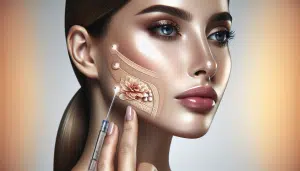Secrets You Might Not Know About Collagen for Skin
Charlotte Stone October 21, 2025
Collagen has become a wellness buzzword, but there’s much more to it than just wrinkle reduction. Dive into this evidence-based guide and discover little-known facts about collagen’s benefits for beauty, wellness, and overall skin health—plus how lifestyle choices can boost natural production.
Understanding Collagen and Why It Matters
Collagen is often called the body’s scaffolding for a good reason—it’s a protein that gives skin, hair, nails, and connective tissue their strength and structure. In the world of beauty, collagen is widely discussed for its effect on skin texture and appearance. When collagen fibers are strong and tightly woven, skin tends to look firm, plump, and youthful. But what exactly is collagen, and what role does it play in your wellness and beauty routine? Simply put, collagen is the most abundant protein in the human body, forming a kind of biological glue that keeps everything held together. Its unique triple-helix structure makes it resistant to stretching, giving tissues both flexibility and resilience. People interested in anti-aging routines often look for ways to maintain or replenish collagen because it naturally decreases as we age (Source: https://www.ncbi.nlm.nih.gov/pmc/articles/PMC7081249/).
Healthy collagen is not only crucial for beauty but is also essential for bodily functions such as joint flexibility, bone integrity, and even wound healing. It works alongside elastin and hyaluronic acid, two other key substances in the skin, to keep it supple and hydrated. Factors like UV exposure, smoking, air pollution, and even high sugar diets can accelerate the breakdown of collagen. As a result, exploring collagen from both a prevention and restoration angle has become a growing topic for anyone searching for ways to improve and preserve skin’s youthful appearance.
Most individuals produce enough collagen naturally until their mid-twenties. After that, the slow decline begins, with subtle changes in skin texture and elasticity marking the years. Unlike some proteins that come solely from food, your body actually synthesizes collagen from amino acids, vitamin C, copper, and zinc, making diet and lifestyle critical. This insight underpins why so many wellness and beauty experts emphasize both internal diet and topical skincare in a comprehensive approach to protecting collagen integrity.
How Collagen Influences Your Skin’s Appearance
One of the biggest beauty trends centers on the promise that boosting collagen can help soften lines, firm skin, and improve overall texture. Research supports a relationship between collagen density and skin quality. As collagen degrades, the support structure beneath the skin weakens, leading to common signs of aging like sagging and wrinkles. Products with peptides, retinoids, and antioxidants are commonly used to support natural collagen processes and enhance results from daily skincare routines (Source: https://www.ncbi.nlm.nih.gov/pmc/articles/PMC4206255/).
Visual changes, such as crow’s feet, fine lines, or crepey patches, are often the first signs that signals collagen loss. However, collagen’s influence goes beyond appearance—well-hydrated, elastic skin is also less prone to irritation, repairs itself more quickly, and can better fend off environmental stress. Interestingly, skin quality isn’t just about thickness or firmness; researchers note that improved collagen structure also correlates with smoother tone and radiance, prompting users to explore both prevention and restoration strategies.
Some individuals are surprised to learn that topical creams rarely deliver collagen deep into the skin due to the protein’s large size. Instead, such products aim to stimulate the body’s own production or protect what is already present by preventing breakdown. Since gut health also plays a part, oral collagen peptides have gained attention for potential systemic benefits. While the research is ongoing, many users report improvements in not only skin tone but also stronger nails and shinier hair after consistent use.
Lifestyle Factors That Harm or Help Collagen
Just as genetics play a role in how much collagen you lose with age, daily habits have a considerable effect. Sun exposure is one of the biggest offenders, as ultraviolet (UV) rays trigger enzymes that break down collagen fibers. Using a broad-spectrum sunscreen year-round is widely recommended by dermatologists to protect skin at any age. Smoking, excessive alcohol, and chronic stress disrupt skin’s healing response and also contribute to accelerated collagen degradation (Source: https://www.aad.org/public/everyday-care/skin-care-secrets/anti-aging/keep-skin-looking-young).
Diet is another modifiable factor. Diets high in processed foods and sugars can lead to glycation, where sugar molecules bind with collagen and elastin, reducing elasticity and making skin more prone to wrinkles. Conversely, antioxidant-rich foods—berries, leafy greens, nuts, and colorful vegetables—may help neutralize oxidative damage and slow collagen breakdown. Hydration, too, can make a difference. Skin that’s well-moisturized, from both water intake and topical use, supports the barrier needed to keep collagen protected.
Quality sleep gives your body the downtime needed to repair and regenerate collagen. Growth hormone is released during deep sleep stages, stimulating cell repair and healthy turnover. Short-term sacrifices—like staying up late or skipping fruits and veggies—might be tempting, but over time, they show on the skin. By aligning your daily routine with proven wellness habits, it’s possible to nurture the body’s own beauty-from-within strategy for keeping skin as healthy as possible with age.
Collagen Supplements and Nutritional Strategies
The buzz around collagen supplements is hard to miss. From powders to gummies, these products claim to improve skin smoothness, nail strength, and joint comfort. But is the science solid? Multiple studies hint that daily intake of hydrolyzed collagen peptides may support modest improvements in skin elasticity and hydration when consistently consumed for eight to twelve weeks (Source: https://www.nih.gov/news-events/nih-research-matters/collagen-supplements-may-improve-skin-health).
Collagen supplements differ from traditional protein powders; the amino acids have been broken down for better absorption. While the body can produce its own collagen given enough raw materials, supplementing may offer additional support, especially as natural synthesis declines with age. Most products are derived from animal sources including bovine, fish, or chicken, so those with dietary preferences may want to look for plant-based options that boost precursor nutrients instead.
Food-based strategies are still a top choice for many wellness enthusiasts. Chicken, eggs, fish, leafy vegetables, citrus fruits, and legumes contain the amino acids and cofactors crucial for collagen formation. Vitamin C in particular acts as a catalyst for collagen synthesis, and shortages can interfere with natural repair processes. Collagen-rich broths and soups, a staple in many traditional diets, are seeing resurgence as part of holistic beauty regimens. Ultimately, both supplemental and natural approaches may have a place in a balanced self-care routine.
Medical Innovations and Professional Treatments
Dermatologists have long explored advanced approaches to stimulate collagen in the deeper layers of the skin. In-office treatments like microneedling, fractional laser therapy, and radiofrequency energy can trigger the body’s wound-healing response—a process that naturally builds new collagen fibers. Such interventions may offer dramatic improvements for those seeking non-surgical rejuvenation, with typical results including tighter, smoother skin and softening of scars or wrinkles (Source: https://www.aad.org/public/diseases/a-z/skin-procedures).
Unlike topical serums, these clinical techniques reach deeper into the dermis, where most collagen renewal happens. Treatments are generally safe when administered by an experienced professional, but they do come with risks—temporary redness, swelling, and the potential for pigmentation changes. Realistic expectations and thorough consultation are key, as benefits often appear gradually as new collagen is formed over weeks to months.
Medical-grade collagen stimulators, such as injectable poly-L-lactic acid, represent another frontier in non-invasive beauty. These products don’t just fill lines—they promote the body’s own collagen synthesis for subtler, longer-lasting results. For those considering these options, reviewing independent data and discussing possible outcomes with credentialed providers is a must. As technology continues to evolve, more people are finding ways to personalize collagen-boosting strategies that fit their lifestyles and beauty goals.
Myths, Misconceptions, and What Actually Works
The collagen craze has led to plenty of myths and creative marketing. It’s important to remember that not every product labeled as collagen-boosting delivers direct, visible benefits. Collagen molecules in creams don’t absorb through intact skin, but supporting ingredients—such as peptides and antioxidants—may still offer value when used regularly. Looking for evidence-based brands and reading product ingredient lists can demystify the experience and set expectations correctly (Source: https://www.hsph.harvard.edu/nutritionsource/collagen/).
Another misconception is that more is always better. The body can only use so many building blocks at once, and excess supplementation generally ends up being excreted. Instead, variety and consistency in wellness approaches appear most effective. Skin health thrives on a multi-pronged approach: sun protection, a nutrient-dense diet, hydration, sleep, and stress management all play important roles alongside carefully chosen topical or supplemental products.
For those exploring collagen strategies for the first time, staying informed is step one. New discoveries about gut health, genetic factors, and emerging ingredients continue to shape the conversation around beauty from within. Individual results differ, but insight and realistic expectations go a long way in building glowing, healthy skin that lasts.
References
1. Shuster, S., Black, M. M., & McVitie, E. (1975). The influence of age and sex on skin thickness, skin collagen, and density. British Journal of Dermatology. Retrieved from https://www.ncbi.nlm.nih.gov/pmc/articles/PMC7081249/
2. Reilly, D. M., & Lozano, M. (2020). Skin collagen through the life stages: Importance for health and well-being. Journal of Investigative Dermatology Symposium Proceedings. Retrieved from https://www.ncbi.nlm.nih.gov/pmc/articles/PMC4206255/
3. American Academy of Dermatology Association. (n.d.). How to keep your skin looking young. Retrieved from https://www.aad.org/public/everyday-care/skin-care-secrets/anti-aging/keep-skin-looking-young
4. National Institutes of Health. (2021). Collagen supplements may improve skin health. Retrieved from https://www.nih.gov/news-events/nih-research-matters/collagen-supplements-may-improve-skin-health
5. American Academy of Dermatology Association. (n.d.). Skin procedures. Retrieved from https://www.aad.org/public/diseases/a-z/skin-procedures
6. Harvard T.H. Chan School of Public Health. (n.d.). The nutrition source: Collagen. Retrieved from https://www.hsph.harvard.edu/nutritionsource/collagen/







